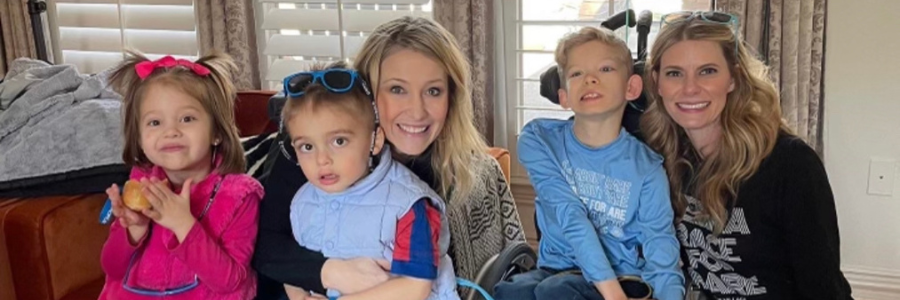Rare Village Foundation Lets Rare Disease Families Know They're Not Alone
Devin Rose - October 05, 2023
“When you get that diagnosis, your life is forever changed, "said Kasey Woleben about receiving the news that her son, Will, had a rare genetic disease. Woleben (on the far right, below, with Will) is co-founder of a non-profit organization that serves as a fundraising platform for families like her own.

Kasey Woleben and Gina Hann have a lot in common. Both women are mothers to first-born sons, Will and Joseph, and younger daughters. Both have had their lives upended by rare diseases that may be treatable with gene therapy. And, as a result, both are founders of the Rare Village Foundation, a volunteer-led organization that serves as a fundraising platform and a point of connection for families affected by rare diseases.
“We are in this community, this village, that no one else has experienced,” said Woleben, whose son Will has Leigh syndrome, a rare neurodegenerative disease that, for Will, was caused by a mutation in the SURF1 gene. Symptoms of Leigh syndrome include loss of head control and motor skills, seizures, and vomiting, as well as weakness and lack of muscle tone as the disease progresses. Hann’s son, Joseph, has Batten disease, which affects the nervous system when faulty genes lead to waste buildup in cells.
“Doctors kept saying my son was going to die”
Woleben’s journey began more than nine years ago when her family received Will’s diagnosis.
“It was a battle from the beginning,” when “doctors kept saying my son was going to die,” she said.
As other rare disease parents know, “our life is turned upside down. Yet we’re supposed to pick ourselves up, quit our jobs, raise money, learn about therapies—it’s devastating,” Woleben said. “When you get that diagnosis, your life is forever changed.”
Woleben and her husband went on to start several non-profit organizations and eventually connected with ASGCT Member Steven Gray, PhD, who has pioneered gene therapy treatments for various rare neurological disorders. Woleben and Hann founded the non-profit Rare Village in 2020 to give rare families a platform to fundraise for gene therapy treatments and to share what they have learned about rare disease research from their experiences.
Goals of Rare Village
Rare Village lays the groundwork for families by giving them the resources and platform they need to “hit the ground running” after receiving a rare disease diagnosis, Woleben said. Existing foundations can apply to enter into fiscal sponsorship agreements under the umbrella of Rare Village. Those foundations can then set up their own fundraising platforms, where they have full control of the landing pages and can see who is donating to their specific fund.
“Parents don’t have the time, the money, to get bylaws set up for a 501 C, so let us do it for you,” Woleben said, adding that foundations do not need to pay a fee to join.
As part of Rare Village, foundations also receive educational and marketing resources, including those from ASGCT’s Patient Education program, and access to an experienced community of parents and patient advocates.
“Rare families trust other rare families,” Woleben said, so it’s beneficial for these families to get connected and share their experiences and what has helped them. One important connection Woleben made was with Amber Freed, who she met through Dr. Gray.
Amber’s son, Maxwell, has SLC6A1, a rare genetic disorder that causes seizures, severe movement and speech disorders, and intellectual disability. Like Woleben, Freed (pictured above, third from left, with Maxwell and his twin sister, Riley) has heard the same questions from overwhelmed parents again and again since she started her foundation, SLC6A1 Connect.
“’How did you do this? How do I get started? My kid is dying—what do I do first?’” Freed asked.
Becoming the GoFundMe for rare disease research
Sometimes, families will contact researchers who refer them to Rare Village. More often, Freed said, families reach out to a particular scientist that doesn’t know where to refer them for such a niche disease or doesn’t have the money to conduct the research.
Woleben said she wants to be able to match families with industry partners and researchers as the organization grows. Freed added making scientists aware of Rare Village—and getting them on board to serve as resources for families—is a big part of that.
Because of the difficulties they’ve faced themselves, “Kasey and I are determined to pay it forward,” Freed said. “We just want to make sure families can get the money where it needs to go.”
Rare Village has so far raised $5 million for rare disease research that will go towards developing gene therapies. If you work in industry and you'd like to become a partner, or if you'd like to get involved with Rare Village in another way, visit their website.
Devin is ASGCT's communications manager. Alexis Starosta, ASGCT's patient outreach manager, contributed to this article.
Related Articles
Maria Santaella, PhD (c), MSN, RN-BC, CPHON serves as the Vice President of Research for the National Bleeding Disorders Foundation. During the workshop she spoke on clinical trial enrollment by sharing strategies to address barriers in recruiting.
Annual Meeting 2024
Inclusive Trial Design Amplifies Patient Voices and Drives Meaningful Outcomes
Samuel Hughes, MBA, St. Jude Children's Research Hospital - June 18, 2024
Patient Perspectives
From Camp to Capitol Hill, Jordan Howard Advocates for Hemophilia
Devin Rose - April 17, 2023
Patient Perspectives
Through the Pain of Fabry Disease, Artist Wes Burian Hasn’t Let Go of Hope
Devin Rose - February 28, 2023
Patient Perspectives
Meet Amber Freed, Mother and SLC6A1 Advocate
ASGCT Staff - January 28, 2021